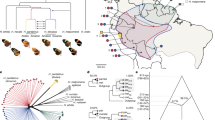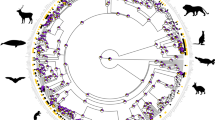Abstract
OPTIMIZATION models have been widely and successfully used in evolutionary ecology to predict the attributes of organisms1á¤-6. Most such models maximize darwinian fitness (or a component of fitness) in the face of trade-offs and constraints; the numerical results usually depend on the exact form of the trade-offs/constraints. Here we report the first (to our knowledge) numerical optimum for life-history evolution which is independent of the details of the underlying trade-off, for a large array for trade-off forms. The rule is that at small litter sizes, the range in offsping size is inversely proportional to the size of the litter. Details of the offspring-survival/offspring-size trade-off7á¤-10 set the value of the proportionality constant, but the á¤-1 exponent, the inverse proportionality itself, is universal. Studies of life histories have yielded many empirical examples of universality for various scaling exponents6 (for example, adult lifespan scales as ≈0.25 with adult body mass within many taxa); this is an example of the numerical value of an exponent (here á¤- 1) emerging from a life-history model as independent of all but a few general features of the underlying economic structure.
This is a preview of subscription content, access via your institution
Access options
Subscribe to this journal
Receive 51 print issues and online access
$199.00 per year
only $3.90 per issue
Buy this article
- Purchase on Springer Link
- Instant access to full article PDF
Prices may be subject to local taxes which are calculated during checkout
Similar content being viewed by others
References
Parker, G. A. & Maynard Smith, J. Nature 348, 27–33 (1990).
Charnov, E. L. The Theory of Sex Allocation (Princeton Univ. Press, 1982).
Stephens, D. W. & Krebs, J. R. Foraging Theory (Princeton Univ. Press, 1986).
Bulmer, M. G. Theoretical Evolutionary Ecology (Sinauer, Sunderland, MA, 1994).
Godfray, H. C. J. Parasitoids (Princeton Univ. Press. 1994).
Charnov, E. L. Life History Invariants (Oxford Univ. Press, 1993).
Charnov, E. L., Downhower, J. F. & L. Brown, Evol. Ecol. 9, 57–63 (1995).
Clutton Brock, T. The Evolution of Parental Care (Princeton Univ. Press, 1991).
Schaffer, W. M. & Gadgil, M. in Ecology and Evolution of Communities (eds Cody, M. & Diamond J. M.) 142–157 (Harvard Univ. Press, Cambridge, MA, 1975).
Smith, C. C. & Fretwell, S. D. Am. Nat. 108, 499–506 (1974).
Stearns, S. C. The Evolution of Life Histories (Oxford Univ. Press, 1992).
Wootton, R. J. J. Fish. Biol. 45, 1067–1077 (1994).
Lloyd, D. G. Am. Nat. 129, 800–817 (1987).
Charnov, E. L. & Berrigan, D. Evol. Ecol. 4, 273–275 (1990).
Beverton, R. J. H. J. Fish. Biol. 41(s), 137–160 (1992).
Shine, R. & Iverson, J. B. Oikos 72, 343–348 (1995).
Author information
Authors and Affiliations
Rights and permissions
About this article
Cite this article
Charnov, E., Downhower, J. A trade-off-invariant life-history rule for optimal offspring size. Nature 376, 418–419 (1995). https://doi.org/10.1038/376418a0
Received:
Accepted:
Issue Date:
DOI: https://doi.org/10.1038/376418a0
This article is cited by
-
Recurrent violations of invariant rules for offspring size: evidence from turtles and the implications for small clutch size models
Oecologia (2013)
-
Offspring size-number trade-off in a lizard with small clutch sizes: tests of invariants and potential implications
Evolutionary Ecology (2009)
-
Scaling of offspring number and mass to plant and animal size: model and meta-analysis
Oecologia (2008)
-
Accessory costs of seed production
Oecologia (2006)
-
Trade-off-invariant rules for evolutionary stable life histories
Nature (1997)
Comments
By submitting a comment you agree to abide by our Terms and Community Guidelines. If you find something abusive or that does not comply with our terms or guidelines please flag it as inappropriate.



